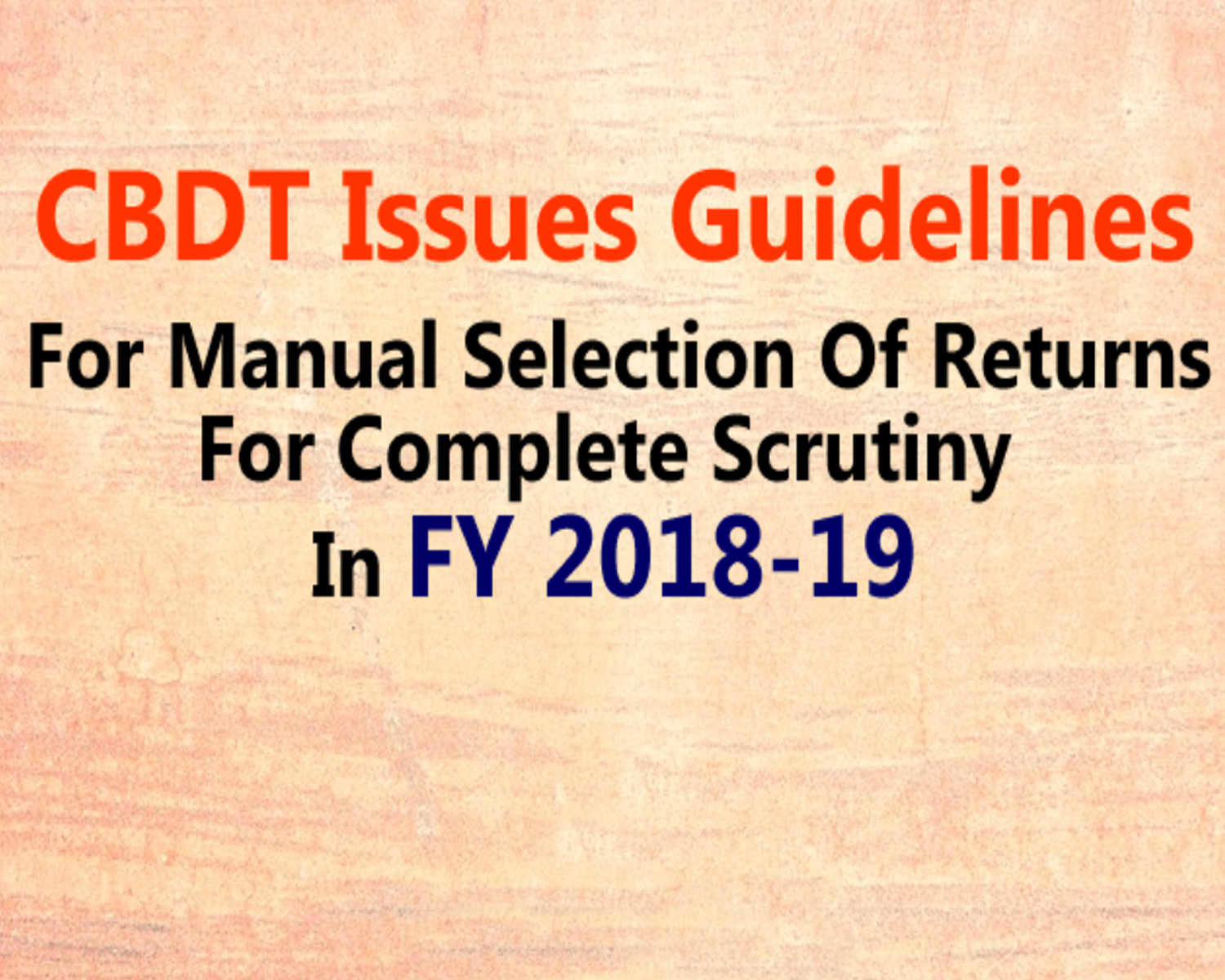- The parameters based on which the manual selection of returns for the complete scrutiny in the FY 2019-20 are as mentioned below:

Guidelines Issued by CBDT For the Manual Selection Of Returns For Complete Scrutiny during the FY 2019-20
(i) Cases that involve addition in previous assessment year(s) on a repeating issue of law or fact:
(a) surpassing Rs. 25 lakhs in 8 metro charges at Bengaluru, Ahmedabad, Chennai, Delhi, Hyderabad, Kolkata, Mumbai and Pune whereas on other charges, the addition should surpass Rs.10 lakhs;
(b) surpassing Rs. 10 crores in cases of transfer pricing, and where such addition:-
- has become final because there has been no filing of further appeal against the assessment order; or
- has been affirmed at any stage of the appellate method in favor of revenue and no further appeal has been filed by the assessee; or
- has been affirmed at the initial appeal stage in favor of revenue or later on; even if the assessee’s further appeal against the order is pending.
(ii) Cases concerning Survey u/s 133A of the IT Act, 1961 (‘Act’) except cases where documents, books of accounts, etc. were not seized and the returned income (exclusive of any disclosure done during the Survey) is not lesser than the preceding AY’s returned income. Nonetheless, where the assessee has withdrawn from the disclosure done during the Survey, similar cases will be considered for investigation.
(iii) Assessments in cases of search and seizure are to be done u/s(s) 153A, 153C, 158BA, 158BC, and 158BD read with section 143(3) of the Income Tax Act along with return filed for the assessment year connected to the previous year in which the permission for search and seizure had been executed u/s132 or 132A of the Act.
(iv) Cases where no registration or approval under different sections of the Act like 12A, 35(1)(ii)/(iia)/(iii), lO(23C), etc . has been allowed or where the approval has been withdrawn or canceled by the Competent Authority, but still, the assessee has been discovered to be claiming tax-exemption in the return. However, wherever such withdrawal of registration/approval orders has been reversed in the appellate proceedings, such cases will not be chosen under this clause.
(v) Cases wherein particular information showing tax-evasion for the applicable year is presented by any law- enforcement/regulatory/intelligence authority or agency. However, before choosing a return for investigation under this criterion, the Assessing Officer will have to take prior administrative approval from the concerned jurisdictional Pr. CIT/Pr.DIT/CIT/DIT concerned.
- With the help of Computer-Aided Scrutiny Selection (CASS), there are two categories in which cases are selected in a centralized manner – Limited Scrutiny and Complete Scrutiny. CASS is a system-based approach for scrutiny selection wherein cases are identified via data-analytics and 360-degree data profiling of taxpayers and is done in a non-discretionary manner. For cases chosen under the CASS cycle 2019, the guidelines have been specified as under:
(i) Cases where the returns have been chosen investigation via CASS but they have not been verified by the assessee within the stipulated e-filing period and such returns stay unverified prior to the due date for issuance of notice u/s 143(2), must be reopened by way of issuing a notice u/s 148 of the Act.
(ii) Cases chosen for ‘Limited Scrutiny’ but valid specific data has been received from any regulatory authority or agency pertaining to tax-evasion in such cases, then only issue(s) resulting from such data can be analyzed during the development of the assessment proceedings in ‘Limited Scrutiny’ cases, with administrative approval of the Pr. CIT/CIT concerned received in advance as per the system laid down in the letter of the Board dated 28.11.2018 issued vide F.No.225/402/2018/ITA-1 1. In such cases of ‘Limited Scrutiny’, the Assessing Officer will not extend the scope of the investigation beyond the issue(s) based on which the specific case was considered under ‘Limited Scrutiny’ and the issue(s) that arise from the data obtained from the above authority or referred agency.